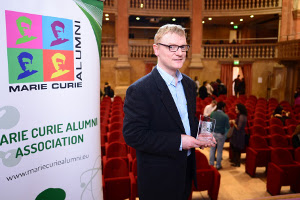Interview with Brian Cahill, Chair
1. May I ask you to introduce yourself briefly?

Brian Cahill
© Fot. Matt, Foto-modelos.es
I am Brian Cahill, an Irish mechanical engineer who develops sensing technology for bioprocess engineering.
After completing my Masters degree, I left Ireland in 1998 to work for Hewlett-Packard in Germany. In 2000, I moved to Switzerland to pursue PhD in the Nanotechnology Group of the Swiss Federal Institute of Technology (ETH) in Zurich. After defending my PhD, I relocated as a postdoctoral researcher to French Switzerland at the Laboratory of Colloid and Surface Chemistry of the University of Geneva.
At the end of 2007, I applied for an Experienced Researcher position as part of a Marie Curie Transfer of Knowledge Project at the Institute of Bioprocessing and Analytical Measurement Techniques in Heilbad Heiligenstadt in Germany. In this project I worked together with German, Estonian and Greek researchers to develop sensing techniques for microfluidic applications. I was so happy with this project that I applied (successfully) for a Marie Curie Reintegration Grant with my host institution and have remained there ever since. I am now Leader of the Junior Research Group.
2. Why did you apply for the Chairperson position within the MCAA?
I became Chair of the German Chapter of MCAA at the beginning of 2015. The German chapter quite quickly became the biggest chapter. Our activities were almost exclusively focused on career development issues. I felt that these issues were central to the aims and existence of MCAA but were relatively under-developed apart from providing micro-grants to Members to attend events. It is my opinion that MCAA has a huge capacity to play a positive role in the Marie Skłodowska Curie Actions with regard to career development issues.
3. As the MCAA Chairperson, what do you plan to do first?
My first activity as Chair was to attend the General Assembly of the Initiative for Science in Europe in Cologne on 9 March: less than a week after the General Assembly in Venice. The ISE is a group of learned societies (EMBL, EMBO, EuroScience and others) that promotes the involvement of scientists in the design of European research policy. The greatest success of ISE was advocating for the creation of ERC grants. The MCAA is currently an observer Member of ISE but MCAA Members are quite active serving in its working Groups.
By participating in such activities we grow our network, develop the capacity of the MCAA to provide feedback on research policy issues to the European Commission and also help to design a research landscape that better serves the needs of our Members.
4. What do you think the MCAA’s priorities should be?
In the medium term, the MCAA must increase its membership and engage the membership with interesting activities. In the framework of the MSC Actions, the activities that stand out are career development training and outreach. By promoting our own events we can build the network of the MCAA with our own Members, research agencies, host institutions and sponsors.
Career development training can be one of very many topics relevant to MCAA Members: bridging science and business, dual careers, gender equality, science communication, research integrity, intellectual property rights, proposal writing or laboratory management. There is a gap in the market for providing such training in the English language in non-English speaking countries.
Outreach activities within the MSC Actions are very often quite generic and rather boring (having your photo taken beside a poster). There is a huge gap for MCAA to develop entertaining outreach activities that engage both our own membership and the general public. The Scottish chapter has been quite active in this field with their series of seminars on "The Science of Fi". I see that their event on 1 April in Edinburgh has sold out.
5. How do you plan to organise your work within the MCAA and especially your collaboration with the other Members of the Board?
Our first Board Meeting will take place on 8 April in Brussels. Our Board Members are spread throughout Europe and the rest of the world but the wonders of modern communication technology make organisation much less complicated nowadays.
I have already had several requests to add topics to the agenda and welcome all contributions from our Board Members. I have quite good relations with all Board Members and trust that we can drive the development of the MCAA in the coming years.
6. What would you say to the Alumni, especially to those who elected you?
Our activities depend on the initiative and engagement of volunteer Members. As such we must be open to enabling our Members to help build the MCAA into a successful organisation. I will support all those who bring energy and creativity into the life of the MCAA.